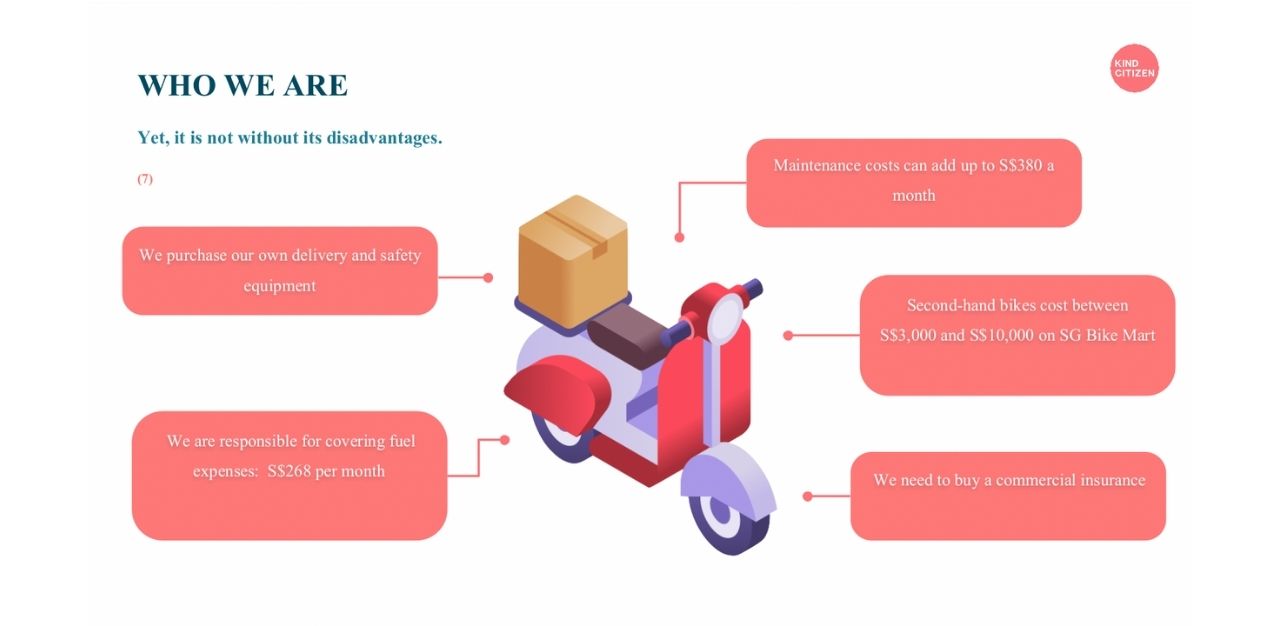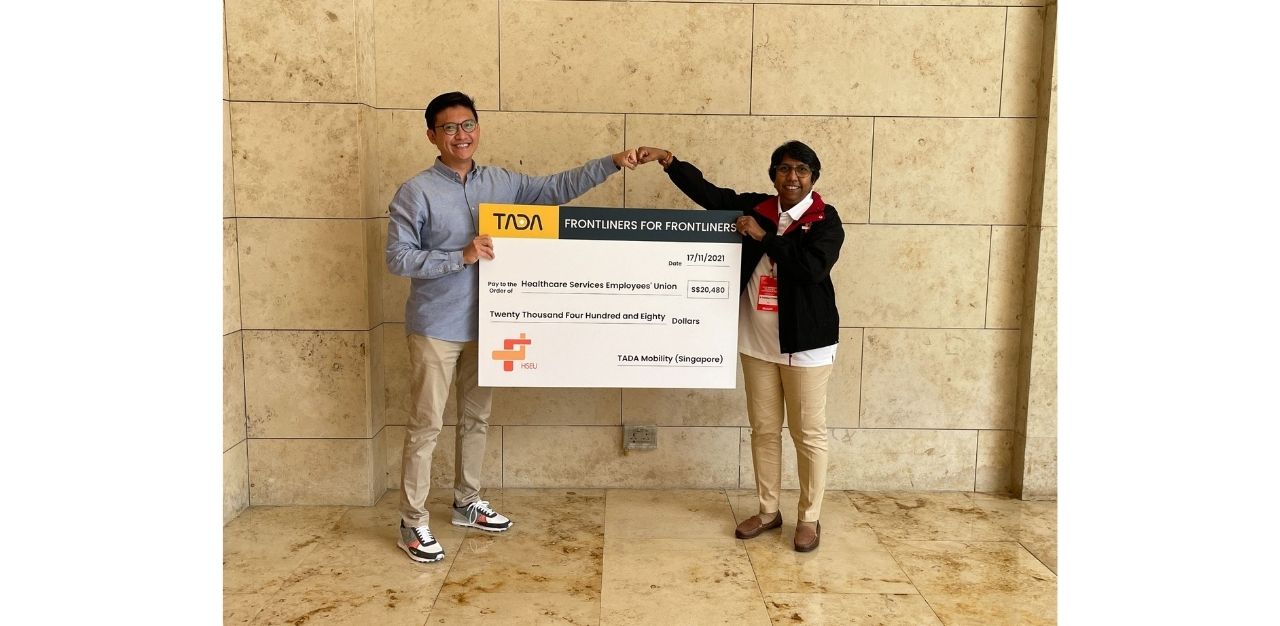In the blink of an eye, Christmas is again upon us. Friends and family aside, the pandemic has put healthcare workers, service staff and drivers at the frontline of the longstanding crisis — as well as in our minds — this giving season.
In an earlier opinion piece, TheHomeGround Asia writer Victoria-Marie Er questioned the premise of organising mass clapping sessions, and sending dozens of cards to our frontliners to show them our appreciation. She emphasised that gratitude goes beyond lip service.
How, then, can average Singaporeans show their support most effectively? What do frontline workers really need?
A research conducted by local social impact marketplace, Kind Citizen, lends some insights into the daily struggles and needs of food delivery riders.
The study revealed that as workers in the gig economy, riders lack basic job protection such as medical coverage, personal accident insurance, and injury compensation.
Yet, as the demand and supply for food delivery increased due to Covid-19 dining out restrictions, riders are at higher risk of mistreatment, exploitation, and safety risks. With long hours on the road and no luxury of paid leave, riders are susceptible to exhaustion, stress, and accidents.
The struggles present themselves threefold — physical, financial, and psychological.
One rider, Ms Elsie Low, admitted that her biggest challenge was road safety due to the stress of making deliveries on time. “No rider will delay deliveries on purpose,” she says. “When customers don’t understand the struggles of the job, they can be rude and it can be really demoralising.”
Added risks arise in instances of bad weather. No one wants to walk or drive outside when it’s pouring — which, incidentally, leads to food orders experiencing an influx.
Another rider, Mr Jerry Toh, recalls being shouted at by a restaurant staff for asking a question about his order, and was then given a one-star rating by the customer “just because the bag was wet”, a result of the pouring rain.
Being in the frontline, many riders are also worried about catching the virus since they are exposed to a multitude of customers and merchants daily.
Ms Bernice Tan, founder and CEO of Kind Citizen, points out that a good proportion of riders consists of single mothers, retirees, ex-offenders, or even the disabled.
“It is more accessible to be a food delivery worker than anything else (nowadays). Conversely to a fixed-term employment, there is no selection process,” she says.
“Being a rider gives them the flexibility of taking care of their families and earning extra cash, which helps them get an income in the shortest time possible. For many who are not able to work full-time, being a rider is the only viable option,” she adds.
On occasions, this is used against riders themselves. Mr Raphael Weathers says a customer told him, “You are late but it’s okay. I know people with tattoos have no future, that’s why you became food delivery riders.”
Forever in crisis mode
Needless to say, private-hire riders are not the only frontliners who have been adversely affected by the pandemic.
On 1 November, Senior Minister of State for Health Janil Puthucheary told CNA that resignation rates among healthcare workers were at a high, with 1,500 healthcare workers resigning in the first half of 2021, compared to the 2,000 annual pre-pandemic number.
This is because healthcare workers were reportedly being “increasingly stretched, overworked, and fatigued”.
A 24- year-old nurse working at the emergency department (ED) of a public hospital describes his workplace as a “madhouse” when Covid-19 cases shot up to the thousands.
“I think my hospital is doing a fantastic job, but there is a maximum capacity. I remember that one of the days, we had to put patients next to each other, making it hard to even move about,” he says, reluctant to give his name for fear of losing his job. The area was built to house 40 patients, but it was putting up with 80 at one point.
Having a longstanding dream of working in emergency healthcare, he knew what he was getting into. Yet, after working in the ED for about four to five months post-graduation, he realised the transition was more taxing than he had ever anticipated.
“Burnout is definitely something most nurses faced during this pandemic. My mental health took a big hit,” he says. “I couldn’t sleep properly, I was having nightmares about work, and that made me more tired the next day. It is a vicious cycle.”
But he believes that it is perhaps ten times harder for his foreign colleagues, who come from countries like the Philippines, India, Malaysia, and China.
“Their countries are badly ravaged by Covid-19, their family members might have been infected, but they’re stuck in Singapore, unable to go home to care for them,” he points out, adding that some of the wards do not allow the nurses to take annual leave to go home and visit their families amidst the pandemic.
On 8 December, Singapore mourned the death of Ms Karunyah Paskaran, a Malaysian nurse who took her own life, “aggravated by the difficulties she faced in returning home to Malaysia”, TODAY online reported.
@sgnightingales, a nurse-run Instagram account, called the incident “a bloody wake up call for everyone in the healthcare sector”.
Problematically, the Ministry of Health, mainstream news sources, and health minister stayed unanimously silent on the incident, as well as the larger issue of staff welfare.
In light of all of this, the ED nurse who spoke to TheHomeGround Asia expresses his exasperation when cases shot from the hundreds to the thousands, yet the government decided not to clamp down on restrictions while opening up the Vaccinated Travel Lanes (VTLs). “I get that businesses need to move on and the economy needs to be driven, but it’s at the expense of our lives,” he says.
So, what can we do?
Gifts are always appreciated, he says, recounting feeling tickled and pleasantly surprised by a local egg supplier who generously sent a tray of quality fresh eggs to him and each of his colleagues.
He also celebrated the announcement by Health Minister Ong Ye Kung that 100,000 healthcare workers will get $4,000 cash awards each for fighting Covid-19.
“However, if I was addressing Singaporeans in general, I would say that the best way to appreciate our frontliners is to just keep yourselves safe. Abide by government regulations, get vaccinated, ” he says.
He adds that while the majority of Singaporean families and patients are appreciative, “you always get one or two who are “a little less grateful”. Being treated like “proper human beings” goes a much longer way than receiving free food or appreciation cards.
On a corporate level, systemic change and support last longer in making a difference to frontliners’ everyday obstacles.
Ride-hailing app TADA launched a new initiative with NTUC-U Care and Healthcare Service Employees’ Union (HSEU), to distribute $20,480 worth of vouchers to 512 needy families of healthcare workers to subsidise their travelling fares.
“We are all in this together. By providing subsidised rides for our healthcare workers, we want to drive home the larger message that our drivers are also fighting the same fight, being on the frontlines,” says Mr Jonathan Chua, Southeast Asia General Manager of TADA.
“Our whole reason for existence is really to improve the livelihoods of drivers by increasing accessibility to technologies, so we work very closely with our drivers,” says Mr Chua.
Since its inception, TADA has updated its app service more than 200 times based on the drivers’ feedback with the features they desire, one of them being instant cashouts so that drivers can foot the many bills they incur on a daily basis.

Mr Said, a full-time private-hire driver with TADA, says that the app’s stakeholder-driven development process has made a substantial difference in the ride-hailing culture.
“When I first became a full-time private-hire driver, I saw this job as an opportunity to increase my income while I have time to be with my family,” he says. “Now, a lot of us don’t even dare to take a break on public holidays or during peak hours — all just to cover our costs and earn a living.”
“Because of the zero-commission policy, drivers on TADA are generally less incentive-driven,” he adds. “We prefer accepting bookings with justifiable fares over vying for peak hour surges, which certainly helps TADA remain a reasonable and predictable price structure.”
In the spirit of giving, Mr Chua urges other corporate organisations to show their support for frontline workers in similarly tangible ways. “I think the best time to show our support is now, so we hope that this encourages others to show their support along the same vein,” he says.

Join the conversations on TheHomeGround Asia’s Facebook and Instagram, and get the latest updates via Telegram.














